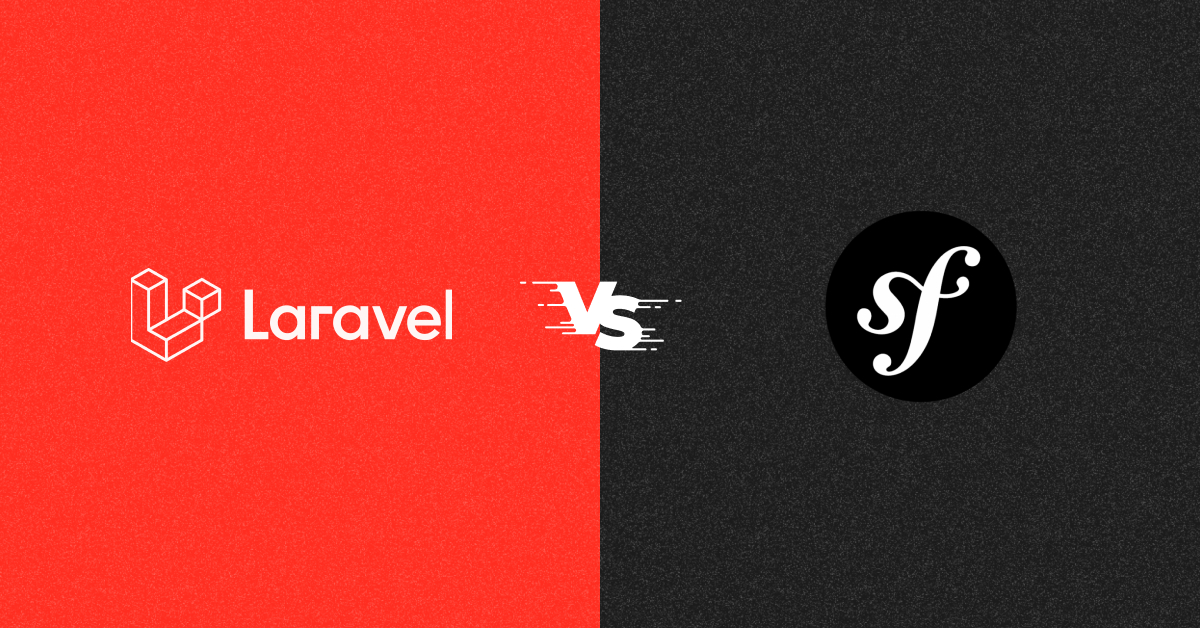
Planning to build a website for your startup or business? Great decision! We are in a digital era, which requires businesses to have a digital presence to reach their customers globally.
The decision to create a new website requires you to look for web development services, which is altogether a different sphere. And picking the right framework is a crucial part of the development process.
Usually, PHP (Hypertext Preprocessor) frameworks are more compelling, and the numbers speak for it. Around 79.2% of all websites prefer PHP programming, which makes it one of the most accepted languages among web developers.
It doesn’t end there. PHP alone has a prolonged list of frameworks, which sometimes confuse developers while picking the right option. Among those options, both Laravel and Symfony emerge as two strong contenders.
So which one is better, Laravel or Symfony? The article elaborates on detailed insights about both frameworks and further compares their features, benefits, and, most importantly – differences. Read along to make an informed decision on picking the right framework for your site.
In a Nutshell
Consider project size, goals, and developer skillset when choosing between Laravel and Symfony. Laravel is ideal for smaller projects with faster development, while Symfony suits larger projects with high traffic. Both offer good performance, security, scalability, and support.
Disclaimer: This is a guest blog submitted by Milan Panchsara, an author at Rlogical Techsoft.
- What is Laravel? Introduction & Features
- What is Symfony? Introduction & Features
- Laravel Vs Symfony: Pros & Cons
- Case Study: Top Real-World Examples of Both the Frameworks
- 5 Factors to Consider When Choosing Between Symfony and Laravel
- Laravel Vs Symfony: Ultimate Comparison Between PHP Frameworks
- Final Verdict: Laravel or Symfony?
What is Laravel? Introduction & Features
Laravel is a top-rated open-source PHP framework that uses an innovative and elegant syntax that supports the MVC architecture. Being the established and feature-rich web application framework, Laravel delivers a fast writing style with a minimized need for configurations.
With the release of Laravel 10, it has been making waves as a rapidly growing framework. However, Laravel is built to reuse existing elements of various frameworks to provide web applications. It even allows you to simply bifurcate the business logic code and display code during the coding process, making the overall process quite lightweight and automated.
Laravel offers efficient application security solutions with in-built authenticating and password options, reducing the risk of data hacking and malware. Let’s have a look at the key features that make Laravel a reliable framework.
- Supports model-view-controller (MVC) design pattern
- Integrated authentication and session solutions
- Enriched unit testing standpoints
- Offers Blade templates engine
- Access to the Artisan command-line tool
Read our detailed guide on how to install Laravel.
Laravel’s Usage Statistics

Developers Trust Cloudways for Hosting Their Laravel Apps
Launch your Laravel apps with ease on our developer-friendly cloud platform & experience blazing-fast speeds and performance.
What is Symfony? Introduction & Features
Symfony framework, like Laravel, incorporates a range of PHP components. In fact, Laravel, even being the leading PHP framework, utilizes around 14 Symfony components.
Symfony combinedly performs to provide unique web applications with relevant concepts and functionalities. It was built in 2011 with the main motive to speed up the web app development process by eliminating the task of repetitive coding hassle.
Due to its reusable PHP component and tracking solutions, you can use it to simplify complicated projects. Symfony framework is versatile enough to provide solutions depending on the numerous project types. Hence, it is widely accepted and trusted as a scalable platform that minimizes turnaround time and errors.
Let’s dig into Symfony’s essential features:
- Utilizes Twig templating language
- Delivers flexible URI routing
- Provides ease of development
- Quick debugging solutions
- Builds structured MVC
Read our detailed guide on how to install Symfony.
Symfony’s Usage Statistics

Laravel Vs Symfony: Pros & Cons
To understand the initial differential overview, let’s evaluate the pros and cons of both PHP frameworks to help you analyze which framework will reap benefits or fail to fill the gaps for you.
Pros of Laravel
- Laravel incorporates the latest and advanced PHP features.
- It enables you to use third-party platforms or integrations for API.
- Compatibility with automated testing models for time savings.
- The template engine allows you to develop layouts for web apps.
- An efficient framework for the rapid development process.
- Laravel users can utilize easy-to-learn and easy-to-read syntax.
- It permits users to modify and add new features without impacting the core functionality.
Cons of Laravel
- Despite being a scalable framework, some of the heavy applications used by Laravel fall behind with slow loading time.
- Although Laravel emerges with new versions, they frequently become incompatible.
- Storing excessive database queries may cause backend data congestion in Laravel.
- Laravel becomes unpredictable for developers with few third-party libraries.
Pros of Symfony
- Symfony is beneficial to create web applications with customized solutions and modify them accordingly.
- Platforms like Drupal and Magento recommend Symfony PHP frameworks over others.
- It is the first pick for heavy projects due to its performance-rich features and complexity minimization.
- Symfony provides access to a wider components range that eradicates writing lengthy and complicated code.
- It has the potential to support and operate heavy databases efficiently.
- Additionally, it supports easy configuration of codes with multiple components.
- Symfony simplifies the unit testing process, making it a preferable framework for developers.
Cons of Symfony
- For developers, learning and upgrading the framework and its components might become time-consuming.
- The development process is slow-paced.
- Symfony’s overall testing takes more than average time.
- The app performance gets affected due to high traffic.
- Some of its elements have origins in other technologies that may result in sluggish loading speed.
Case Study: Top Real-World Examples of Both the Frameworks
Considering the examples of both PHP frameworks, it becomes easier to understand which one will be suitable for a certain business scenario. So, let’s comprehend the examples one by one.
Laravel Framework Examples
Let’s have a look at some major businesses using Laravel as their PHP frameworks.
1) Alison

Alison is among the biggest free e-learning platforms developed using Laravel. It primarily targets students to provide them with free access to online learning courses.
Around 21 million students have enrolled in Alison, and Laravel has made the website seamlessly managed for sharing across several mediums – adhering to its motto of building and sharing.
Moreover, Laravel’s scalability features facilitate the site to perform better and support the ever-expanding community.
2) Invoice Ninja

Invoice Ninja is a renowned platform for freelancers and firms. Basically, it is an open-source invoicing solution that prepares invoices, manages payments, tracks incomes, expenditures, etc.
Being developed with the Laravel framework, the website offers extra solutions for creating cutting-edge infrastructure. Additionally, it also utilizes Laravel for personalizing user permission levels.
3) Laravel.io

The Laravel community has built a portal called Laravel.io for knowledge sharing and resolving issues. It has been designed to assist Laravel developers with better web development practices.
Laravel.io offers the latest news, podcasts, and many other recent Laravel updates. It relies on Laravel as its PHP framework and has its users increasing in numbers, providing solutions to developers for new web development.
Symfony Framework Examples
This section covers the major platforms and businesses using Symfony as their PHP framework.
1) Spotify

The booming music app with over 75 million users relies on the Symfony framework. Symfony handles the app’s maintenance and controls the applications’ requests.
Furthermore, Symfony has increased Spotify‘s efficiency by adding personalized features. And not to forget that it effortlessly deals with the massive traffic on the app.
2) Trivago

Trivago is a well-established hotel booking app that lets you check & compare hotel prices and confirm the booking.
Unsurprisingly, it has also opted for Symfony to manage the huge traffic on its website and provide better hotel options at the best prices. Being developed with Symfony provides a customized and better user experience.
3) Vogue France/Netherlands

Well, Vogue doesn’t need any introduction; it is the most popular fashion and lifestyle magazine worldwide. Many countries have their own Vogue websites like Vogue India and others. Among them, Vogue France (formerly known as Vogue Paris) uses Symfony and found great results of higher visitors and optimized website experience.
Taking its example, Dutch Vogue (Vogue Netherlands) also went with the Symfony PHP framework.
So, keeping the major websites mentioned here in mind, Symfony has proven itself among the most trusted picks as a PHP framework.
Symfony Hosting Made Easy – Start Developing Today
Develop scalable Symfony web apps with ease & enjoy unmatched performance results on our managed cloud servers.
Laravel vs Symfony: Which Framework Is Preferred by Successful Websites?
After looking into the recent websites, the weightage of the Symfony framework is better for websites that drive a huge number of daily traffic. That doesn’t mean that Laravel is not preferable. It’s just that Laravel is a good pick for small-sized projects. However, you can also narrow down the selection by acknowledging the factors of both frameworks.
5 Factors to Consider When Choosing Between Symfony and Laravel
While choosing a PHP framework between Symfony and Laravel, you need to have certain pointers in mind that will minimize the risk of a wrong decision. Here are some of those:
1) Project Requirements
What sort of business you have, its major necessities, type, target audience, locality, etc, are the primary focus for deciding upon the accurate project requirements. It gives clarity on the do’s and don’ts of the web development process and consequently determines the framework.
2) Project Size
As mentioned above, the project size makes a bigger difference in the selection process. Usually, Laravel should be selected for small and medium-sized businesses (SMBs), and Symfony has the potential to handle big and high-investment projects.
3) Business Goals
Laravel is better suited for faster development and short-term business goals. Conversely, Symfony is a better choice for long-term business goals and vast audience-capturing websites.
4) Developers’ Skillset
Laravel is a simplified and beginner-friendly framework that demands fewer programming skills. Whereas Symfony is a bit complicated and has a wider learning curve to manage object-oriented programming and other advanced technicalities.
5) Timeframe
The project’s completion timeframe makes your overall framework finalizing process easier. For getting the rapid development process and quick website deployment, Laravel is the better fit. On the other hand, Symfony requires more time to deliver the final product.
You need to examine each factor thoroughly to make the correct choice. Yet, if you are confused, the analysis below will surely give you an appropriate solution.
Unleash the Full Potential of Laravel and Symfony
Use Cloudways’ performance-optimized hosting for Laravel and Symfony frameworks & experience the ultimate combination of powerful frameworks and cutting-edge cloud infrastructure.
Laravel Vs Symfony: Ultimate Comparison Between PHP Frameworks
The major decision-making between Laravel and Symfony PHP frameworks is a challenging task. So, for the sake of convenience, cost, and time-saving measures, you need to look for the prominent aspects.
This section covers the comparative analysis list, which will help you opt for the right framework.
1) Performance Overview
A framework’s performance is the foremost selection consideration. Laravel is booming in the market with an established user base.
And its performance has also been enhanced with the launch of new upgrades and versions. An average Laravel-based website loads in around 60 milliseconds.
Symfony has also worked hard to improve its performance. With the release of Symfony 6.3, it has integrated many modifications for better performance. Still, Symfony sites take approximately 250 milliseconds to load.
So, the performance parameter indicates that Laravel takes the lead in the site’s high performance. That said, your site’s performance relies heavily on a fast hosting provider, and experts recommend going for managed cloud hosting solutions for optimum performance results.
2) Security
No matter how detailed and tricky security patches you have, setting them up effectively is a more important concern.
Laravel has a sort-out and less complicated approach to managing security during app development services. However, Laravel has a set of authentication and password management approaches to secure the application data.
On the other hand, Symfony, with its cutting-edge security systems and permission schemes, requires strategic implementation.
So, both frameworks meet the requirements for security from basic to advanced. Resultantly, it becomes a matter of choice of developers that can work on bringing the most out of the website’s security.
PRO TIP: You can always strengthen your website’s security by opting for a secure hosting provider like Cloudways.
3) Database Migration
Database migration demands extensive attention and in-depth processing from the developer’s end.
For Laravel, the entire database migration process is manually processed without ascertaining the field definitions.
Whereas, Symphony is completely driven by automated database migrations. It requires you to streamline the definitions based on the field models. Hence, database migration can provide equivalent solutions from both frameworks.
4) Scalability
Laravel demonstrates its scalability through numerous successful apps in the online marketplace. It boasts an inherently scalable PHP framework that enables rapid and efficient solutions. Additionally, Laravel leverages powerful technologies like MySQL and advanced caching techniques to enhance its scalability further.
On the other hand, Symfony enables applications to scale efficiently by employing reusable components. It empowers developers to optimize the application’s scalability by managing user requests through multiple production instances.
Overall, both Laravel and Symfony offer commendable scalability features, making them top contenders in the realm of web development. However, the ultimate winner in this context depends on specific project requirements and the development team’s preferences.
5) Cost
Laravel and Symfony are both exceptional choices for developing your web application using PHP.
Laravel, a versatile and cost-effective PHP framework, empowers developers to create feature-rich components, ensuring a streamlined development process effortlessly. The expenses associated with Laravel developers are determined by project size and time invested.
Similarly, Symfony offers a comparable advantage. It equips developers with the tools to manage reusable libraries, expediting the development process efficiently. Symfony developers’ fees are influenced by project complexity and hours dedicated to the task.
When selecting between the two frameworks, consider the available resources that align with your budget. Ultimately, the choice rests upon your specific needs and financial considerations.
6) Support
The support factor of PHP frameworks is the things to look out for to manage various tasks with ease. Laravel offers a database support system that increases the efficiency of developers and minimizes time and effort. Laravel supports SQLite, MySQL, SQLServer, etc, databases that easily access and manipulate databases.
While Symfony framework majorly supports SQLite, Drizzle, SQLite, SAP, and PostgreSQL. All-in-all Symfony has more databases than Laravel. Moreover, Laravel is more efficient and faster than Symfony, so the support factor is somewhat displayed in both PHP frameworks.
Final Verdict: Laravel or Symfony?
Both Laravel and Symfony are powerful and reliable frameworks that strengthen their roots in web development solutions.
Still, there’s no fixed and obvious answer to the question of which PHP framework should be used. The only ideal key is the project size.
Following that, the Laravel PHP framework is ideal for working on smaller web development projects. And if you’re working on a long-term complex web application project, Symfony may be a better option because of its stability and other aspects.
Aside from that, choosing the best web development company may work out well. You can go for an outsourcing option, and the company can suggest you the best-suited framework for your business.
Ultimately, your project’s size and complexity will guide you toward the most suitable choice, ensuring a seamless and successful web development journey.
Author’s Bio
 |
I am Milan Panchsara. Being a Marketing enthusiast, I assist online businesses to boost ranking and traffic through various marketing strategies. At Rlogical Techsoft, a web development company, I undertake a unique marketing method with a ‘Can-Do’ attitude for each project. With extensive research & analysis, I like sharing my thoughts on emerging technologies & new marketing trends. |
Sarim Javaid
Sarim Javaid is a Digital Content Producer at Cloudways. He has a habit of penning down his random thoughts and giving words and meaning to the clutter of ideas colliding inside his mind. His obsession with Google and his curious mind add to his research-based writing. Other than that, he's a music and art admirer and an overly-excited person.


